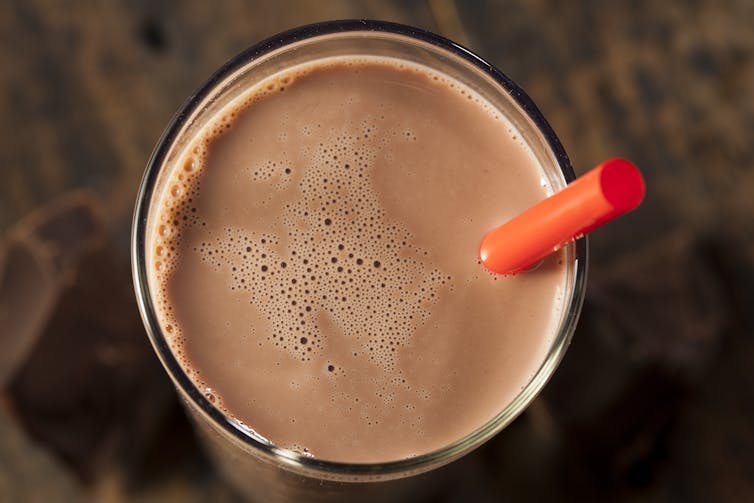Whether you enjoy chocolate milk regularly, as a weekend treat, or as an occasional dose of childhood nostalgia, it’s probably not the first option that comes to mind for post-workout recovery.
Unless, maybe, you’re on TikTok. According to many people on the social media platform, chocolate milk is not only delicious, but it also offers benefits comparable to post-workout sports drinks.
Is there any evidence for this? Let’s take a look.
Proper hydration after training is important
Water makes up about 50 to 60% of our body weight. Water has many important functions in the body, including helping to keep our body at the right temperature through sweating.
We naturally lose water when we sweat, but also through breathing and going to the toilet, so it is important to drink enough to compensate for the water loss.
If we don’t, we become dehydrated, which can put stress on our bodies. Signs and symptoms of dehydration can range from thirst and dizziness to low blood pressure and confusion.
Athletes lose more water through sweating and through respiration (when their breathing rate increases) due to their increased exertion. When they train or compete in hot or humid environments, they sweat even more.
Dehydration affects the performance of athletes and, like all of us, can affect their health.
Therefore, it is important to find ways to ensure that athletes quickly rehydrate during and after training or competition. Fortunately, sports scientists and nutritionists have studied the composition of different fluids to find out which ones are most effective at rehydrating athletes.
The beverage hydration index
The best hydrating drinks are those that the body retains best after consumption. Through studies in which people were given different drinks under standardized conditions, scientists were able to find out how different options behave.
To this end, they have developed what is known as the Beverage Hydration Index, which measures the extent to which different liquids hydrate a person compared to still water.
According to this index, mineral water, sports drinks, cola, diet cola, tea, coffee and beer with less than 4% alcohol are among the beverages with similar fluid retention to still water. However, alcohol is probably best avoided during recovery after exercise.
Beverages that have better fluid retention than still water include milk (both whole and skim), soy milk, orange juice, and oral rehydration solutions.
These research results indicate that neutral milk (whole milk, skim milk or soy milk) is better than sports drinks for post-exercise rehydration.
But what about chocolate milk?
One small study looked at the effects of chocolate milk compared to regular milk on rehydration and exercise performance in futsal players (futsal is similar to soccer but played indoors). The researchers found no difference in rehydration between the two. To my knowledge, there is no other published study examining how chocolate milk compares to regular milk for rehydration during or after exercise.
But rehydration isn’t the only thing athletes want from sports drinks. In the same study, drinking chocolate milk after a game (the so-called recovery phase) increased the time it took futsal players to become exhausted during further exercise (a shuttle running test) four hours later.
This was also shown by a review of several clinical studies. The analysis found that chocolate milk increased the time to exhaustion during exercise compared to various placebos (such as water) or other drinks containing fat, protein and carbohydrates.
What’s in chocolate milk?
Milk contains proteins, carbohydrates and electrolytes, each of which can affect hydration, performance, or both.
Protein is important for building muscle, which in turn has a positive effect on performance. The electrolytes in milk (including sodium and potassium) help replace electrolytes lost through sweating, so can also be good for performance and aid hydration.
Compared to regular milk, chocolate milk contains additional sugar. This provides additional carbohydrates, which also have a positive effect on performance. Carbohydrates provide an immediate source of energy for the working muscles of athletes, where they are stored as glycogen. This could contribute to chocolate milk appearing to have an advantage over regular milk in terms of athletic endurance.

Brent Hofacker/Shutterstock
Coffee milk has another benefit: it contains caffeine, which can improve athletic performance by reducing the perceived exertion during exercise.
One study showed that a frappé-like drink made from filter coffee, skim milk and sugar resulted in better post-exercise muscle glycogen levels than regular milk with the same amount of added sugar.
So what is the verdict?
There is evidence that chocolate milk can rehydrate the body better after exercise than water or sports drinks. However, there is no evidence that it can rehydrate the body better than regular milk. However, chocolate milk does appear to improve exercise endurance compared to regular milk.
Ultimately, the best drink for athletes to rehydrate is the one they are most likely to drink.
Although many TikTok trends aren’t based on evidence, chocolate milk actually seems to be a good option for post-workout recovery. And it’s cheaper than specialty sports nutrition products. You can buy different brands at the supermarket or make your own at home using a drinking chocolate powder.
This doesn’t mean that everyone should reach for chocolate milk when they’re thirsty. Chocolate milk has more calories than regular milk and many other beverages because of the added sugar. For most of us, chocolate milk is probably more of an occasional treat.

